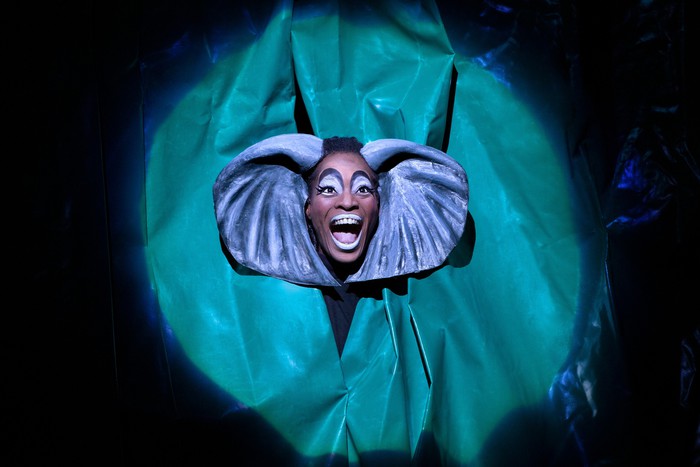"I was in the Amazon, in Borneo, I saw the destruction of the forest, of nature and the great threat to animals. I certainly had everything in mind while working on this show. But I don't think theater should give lessons. I don't seek to change the world. I try to make people reflect and think ". This is how Robert Wilson, the "visionary" Master of the theater, plunged into the universe of Rudyard Kipling's "Jungle Book" and together with the folk duo CocoRosie (in their fourth collaboration on the stage) transformed it into "his" world: a whirlwind of musical languages and colors where the narrator is an elephant with black skin and large blue drawn ears, the panther wears a bright orange shirt or the grass grows in large green triangles.
"I dreamed of a show that the whole family could watch together and I dreamed of working with young people from different countries, ethnic origins and backgrounds", says he, who in the past has already plunged into the world of Alice in Wonderland, Peter Pan or the fables of La Fontaine.
The project, initiated by the Théâtre de la Ville in Paris, co-produced by the Teatro della Pergola in Florence and presented in world premiere at the Grand Théâtre du Luxembourg in 2019, now arrives with a cast of 40 exclusively Italian interpreters at the Pergola, from 3 to 6 February, two years after "Mary said what she said" with Isabelle Huppert and after the long hiatus due to the pandemic.
And it is only the first of a series of international co-productions, which, says the manager of the international part of the Teatro della Toscana Foundation,
"It was my aunt who read me The Jungle Book, when I was a child in Texas and then Pierre Bergé (Yves Saint Laurent's partner ed) in Paris who suggested that I draw a show - says the director - It seemed to me that time was the the right moment, because we have many reasons for concern for the environment, for the fate of animals and because it is important today to understand how important the family is ".
In three acts, his adaptation follows the trials of human cub Mowgli from arriving in the jungle, where he is adopted by wolves, to hopes of finding a real family.
Around this time, he kills his nemesis, the tiger Shere Khan, but also finds himself abandoned by old friends like Baloo the bear to Bagheera the panther.
At first, their affection overcomes the merciless brutality known as the "law of the jungle," but this will prove just as strong in the human world.
"Baudelaire used to say that genius is nothing more than childhood rediscovered at will - continues Wilson - In all important works there must be a child. Medea, for example, the only way to humanize her is to see the child she once was. The same goes for Salomé or King Lear. But for me it is important to think not only of the child among the protagonists, but also of the one who is sitting in the audience in the adult audience ".
The animals?
"They are in all my works. There were even in '67 -'68 in a show named after Sigmund Freud. I grew up with animals and I learned a lot by observing them", he continues, recounting "listening with the eyes of the panther" or the hunting trips where his father dragged him and in which, he says, "I always identified with the deer".
As for inspirations,
One evening Andy Warhol also told me - he says - But my work is very different ". It takes more" from Matisse that I discovered as a child "or" from the many countries where I worked, from Latin America to the Middle East "passing through the" Balinese dances and the Japanese No theater ". As for the colonialist attitude that some criticize of Kipling, he replies:" he was a human being, with his contradictions, like everyone else.
As an artist - he adds - I think the most important thing is to ask questions.
You have to keep an open mind, keep thinking, but I don't want people to see what I see or think what I think.
One evening Andy Warhol also told me - he says - But my work is very different ". It takes more" from Matisse that I discovered as a child "or" from the many countries where I worked, from Latin America to the Middle East "passing through the" Balinese dances and the Japanese No theater ". As for the colonialist attitude that some criticize of Kipling, he replies:" he was a human being, with his contradictions, like everyone else.
As an artist - he adds - I think the most important thing is to ask questions.
You have to keep an open mind, keep thinking, but I don't want people to see what I see or think what I think.
passing by the "Balinese dances and the Japanese No theater".
As for the colonialist attitude that some criticize of Kipling, he replies: "he was a human being, with his contradictions, like everyone else. As an artist - he adds - I think the most important thing is to ask questions. We must keep an open mind, continue to think, but I don't want people to see what I see or think what I think.
The interpretation of a show is up to the public and perhaps, in the long run, to the philosophers ".

